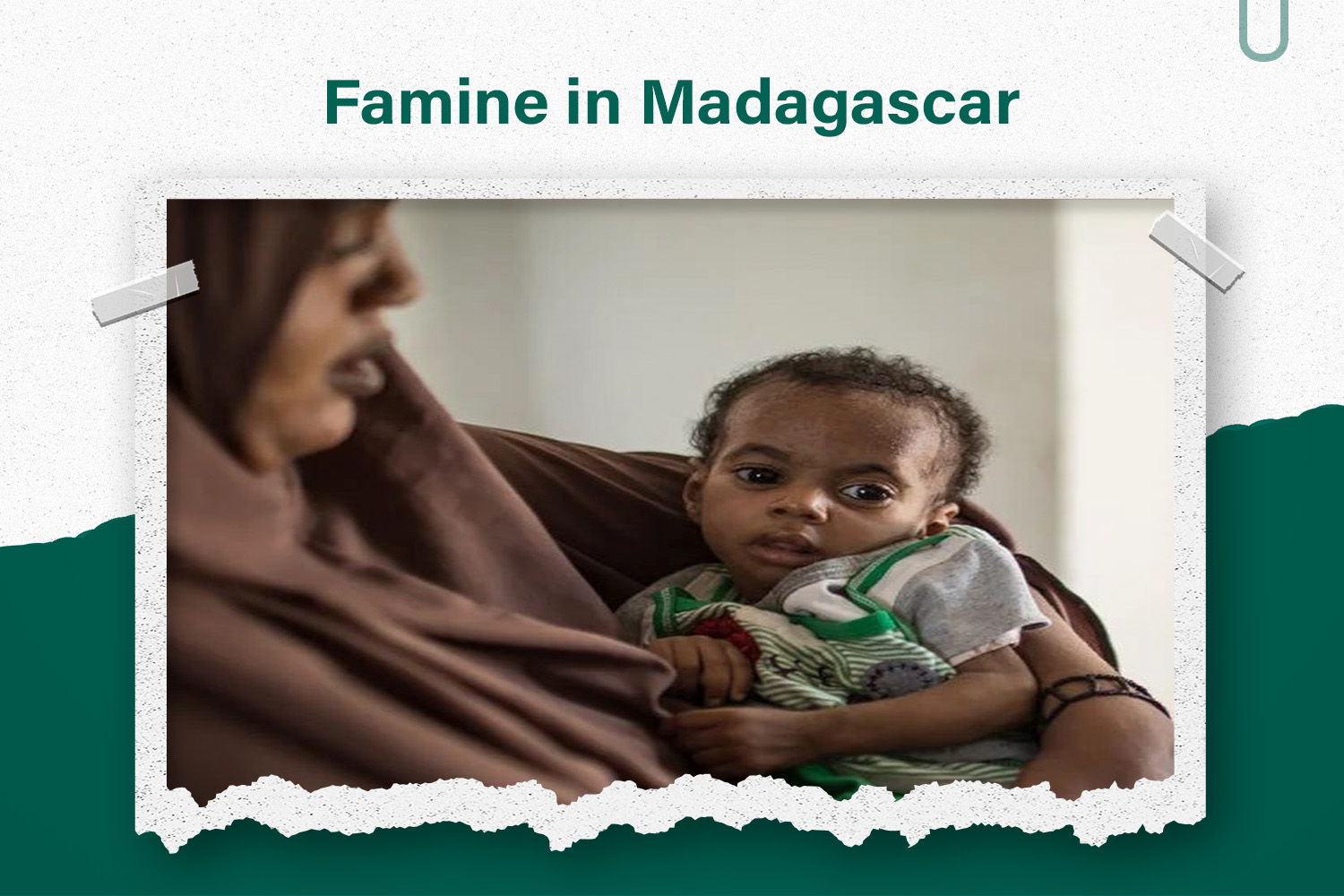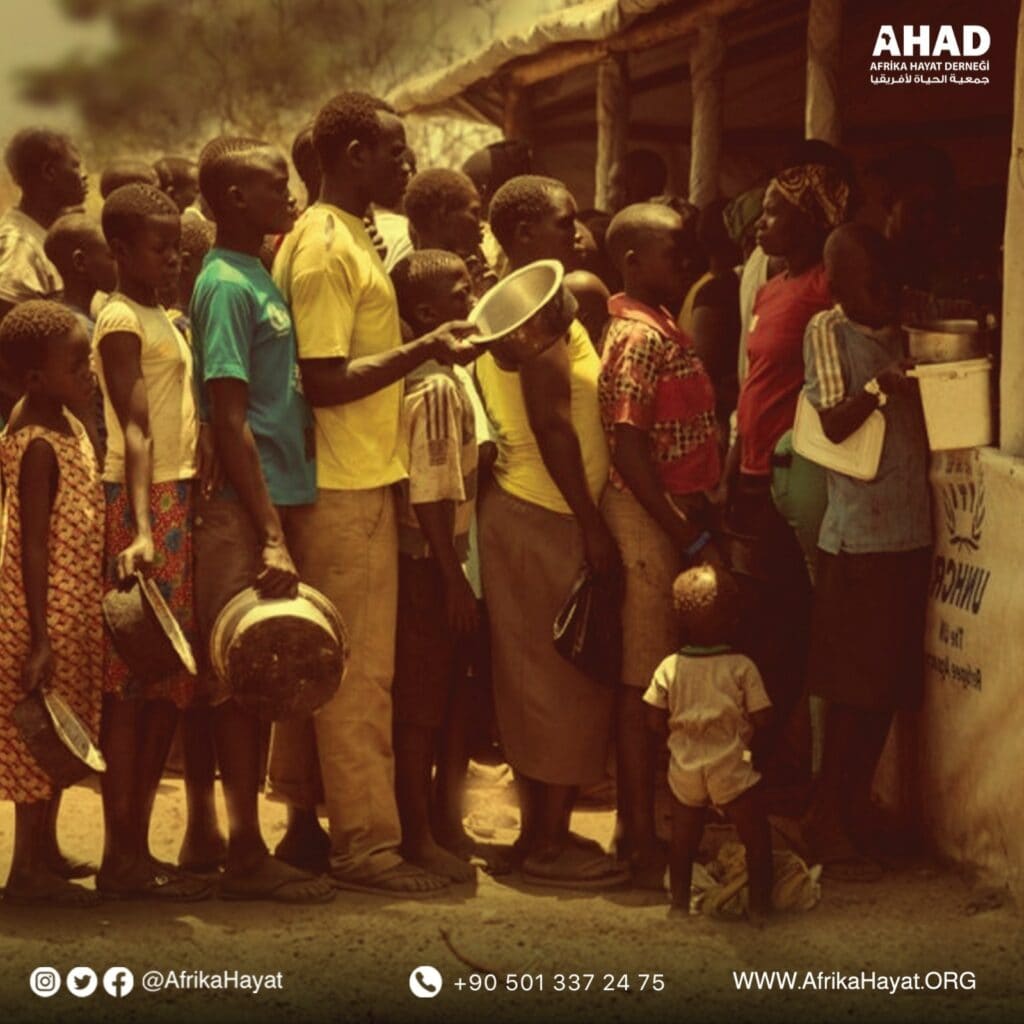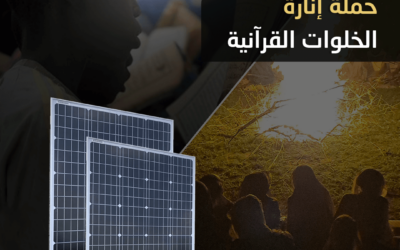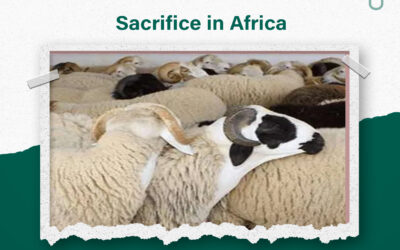Famine in Madagascar
Currently, Madagascar is experiencing an accelerated aggravation of the problem of famine, which poses a serious threat to the health and safety of the country’s population. The negative impact of famine on people, the economy and the environment is one of the things that cannot be ignored. In this article, we will dwell on the definition of famine in Madagascar and its main causes.
AHAD exists to influence the life of the communities it serves, to adopt the capabilities of its members to take ownership of their lives, build their capabilities and achieve a better life for them.
Definition of famine in Madagascar:
Famine in Madagascar means an acute shortage of the availability of food and basic foodstuffs for the population. Many factors are causing this famine, such as extreme climate changes, persistent drought, reduced crop production and high food prices. Many regions of Madagascar are experiencing an acute shortage of food resources.
Causes of famine in Madagascar:
Climate change: Madagascar is exposed to constant climate changes, such as frequent droughts and irregular rains. This negatively affects the production of agricultural crops and increases the difficulty of obtaining food.
Low agricultural production: much of Madagascar’s population depends on agriculture for livelihoods. However, the country suffers from low crop production due to climatic changes and poor agricultural practices. This leads to a shortage of food available to the population.
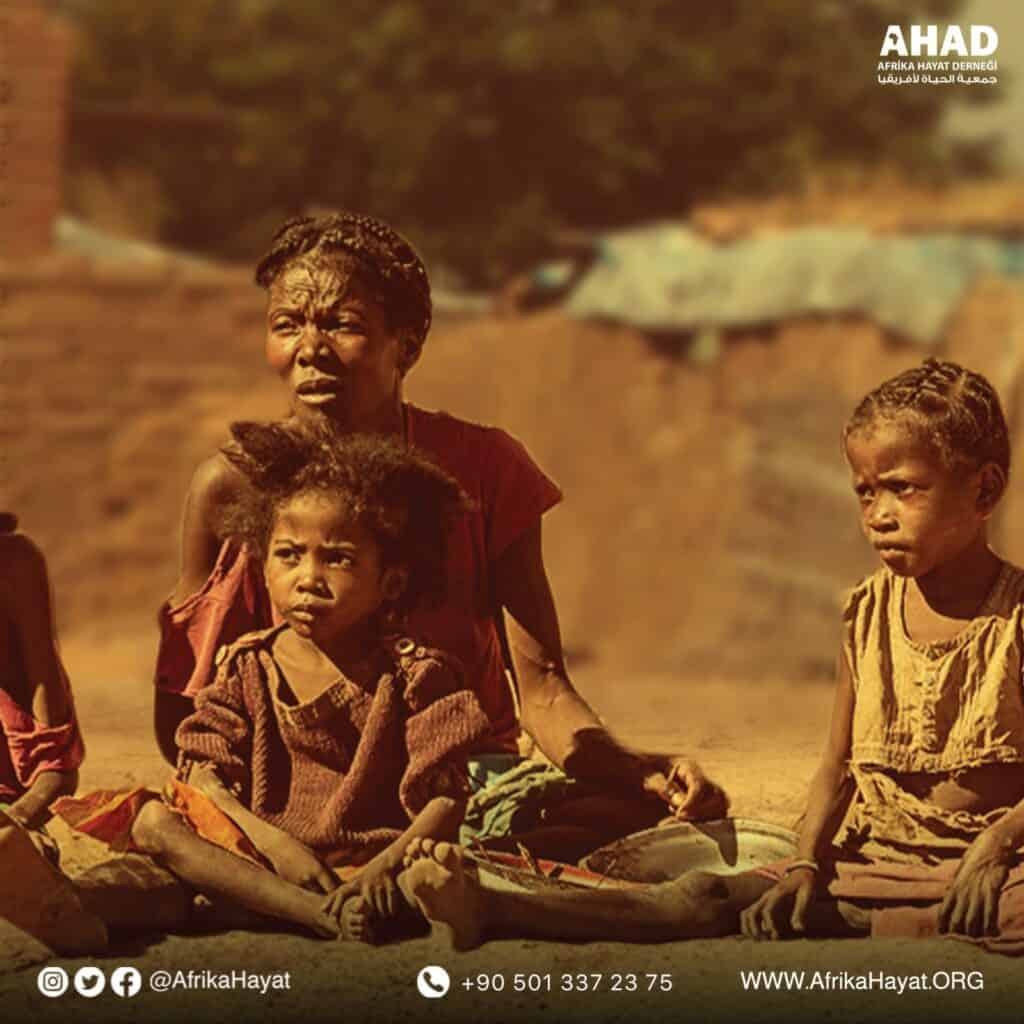
Famine in Madagascar
Madagascar poverty: many Malagasy people face the problem of extreme poverty, which means that they do not have the financial means to buy enough food for themselves and their families. Poverty increases the fragility of society and increases the number of people vulnerable to starvation.
Madagascar needs urgent intervention to address the problem of famine and provide food resources to the population. Investment in Sustainable Agriculture, Improvement of farming practices, provision of food aid and development of programs to enhance food security in the country should be strengthened.
Effects of famine in Madagascar:
Effects of famine on children
Famine in Madagascar is a serious threat to the health and safety of the population, in particular children. Children living in famine zones experience an acute shortage of proper nutrition, which negatively affects their growth and development. The prevalence of malnutrition among children in Madagascar increases the risk of multiple diseases and weakened immunity. This increases the number of pathological conditions and increases mortality from infectious diseases.
Effects of famine on the economy and development:
The famine in Madagascar also affects the economy and development of the country. Food shortages and increasing hunger rates lead to low productivity and reduced economic growth. It becomes difficult for individuals to achieve financial stability and improve their livelihood under famine conditions. The increase in poverty and unemployment, the lack of sustainable development and employment opportunities. In addition, some people may have to resort to forced migration or displacement in search of better opportunities, which affects the stability of the country.
The importance of urgent intervention to address the problem of famine in Madagascar cannot be ignored. We must invest in improving food security and promoting sustainable agriculture. Food assistance should also be provided and emphasis should be placed on the development of programs to help improve the health status of children, promote employment opportunities and economic development of famine-affected communities.
Efforts to reduce famine in Madagascar:
Anti-famine programs and organizations
The efforts to combat famine in Madagascar are not limited to the efforts of the government, but also include the efforts of many programs and non-governmental organizations interested in working to mitigate and combat the effects of famine. These programs work to provide urgent assistance to those affected by famine through the distribution of food, water and health care. They are also developing long-term programmes to enhance food security and promote sustainable agriculture in the affected areas.
Among these programs and organizations concerned with the fight against famine in Madagascar, we find the Ahad, which has carried out many campaigns and assistance to distribute food and improve life in Madagascar.
Fighting hunger and achieving sustainability in Madagascar:
Growing the right crops to meet nutritional needs
To face the problem of famine in Madagascar, appropriate crops must be grown to meet the population’s food needs. Rice is a major crop in Madagascar on which the population relies as a primary source of food. Therefore, sustainable farming techniques should be developed and productivity should be increased to ensure the supply of sufficient quantities of rice and a variety of other crops to diversify the diet and reduce the spread of hunger.
Sustainable agricultural enterprise development:
It is necessary to develop sustainable agricultural enterprises in Madagascar to address the problem of famine. Such projects can include the creation of farms operating a system of protected agriculture and raising livestock in sustainable ways. It is also possible to develop reforestation and environmental improvement projects for degraded lands and motivate farmers to use water conservation and land management techniques in effective ways.
Through the development of sustainable agricultural enterprises, it is possible to achieve food security in Madagascar and create jobs in the agricultural sector.
In the end, it is important for all of us to fight famine and achieve sustainability in Madagascar. This requires cooperation between the government and local and international organizations to implement strong strategies for growing suitable crops and developing sustainable agricultural projects. Through these joint efforts, safe nutrition and environmental sustainability can be achieved in Madagascar.
Taking action to prevent the return of famine in Madagascar:
Community empowerment and capacity building
To prevent the return of famine in Madagascar, it is important to empower local communities and build capacity. Community participation and empowerment should be promoted in decision-making processes and the implementation of sustainable solutions. This can be achieved by providing the necessary training, education and resources to local communities to develop sustainable agriculture skills and manage natural resources in effective ways.
Development of government policies to prevent famine:
Government policies play a crucial role in preventing the return of famine in Madagascar. Policies should focus on promoting agricultural sustainability, providing social protection and strengthening local food systems. Financial and technical support should be provided to farmers and rural communities to improve agricultural attainment and environmental sustainability. In addition, the government should promote market transparency and regulation to ensure the availability of affordable and appropriate food for local communities.
By empowering local communities, building capacities and developing appropriate government policies, the return of famine in Madagascar can be prevented and food sustainability achieved in the future. These efforts require cooperation and partnership between the government and local and international organizations to implement strong strategies and ensure the availability of food and food security for all residents of Madagascar.
Conclusion
The famine in Madagascar is a real and urgent problem that must be urgently resolved. This requires joint efforts of all interested parties, including the government, local and international organizations. Madagascar needs to promote agricultural sustainability, provide social protection and strengthen local food systems. The government should develop effective policies aimed at improving agricultural attainment and promoting sustainable development in rural areas.
The importance of solving the famine problem in Madagascar:
Solving the problem of famine in Madagascar is necessary for several reasons. First of all, the famine threatens the lives of thousands of local residents and leads to an acute shortage of nutrition. They also negatively affect the economic growth and social stability of the region. In addition, the international community must cooperate to resolve this crisis, as famine is one of the most important challenges facing humanity at present.
By focusing on community empowerment and capacity building, and developing appropriate government policies, we can solve the famine problem in Madagascar and achieve food sustainability in the future. Everyone must work in cooperation and partnership to ensure the availability of food and food security for all the inhabitants of Madagascar and to eliminate this devastating crisis. Only by taking the necessary measures and constant cooperation can we achieve this noble goal.
At the end of the article, we thank the long-time pioneer in humanitarian work, AHAD, which uses the phrase ” because it deserves life” as its motto, believes in it and works hard to fulfill its dictates
ALSO READ:

